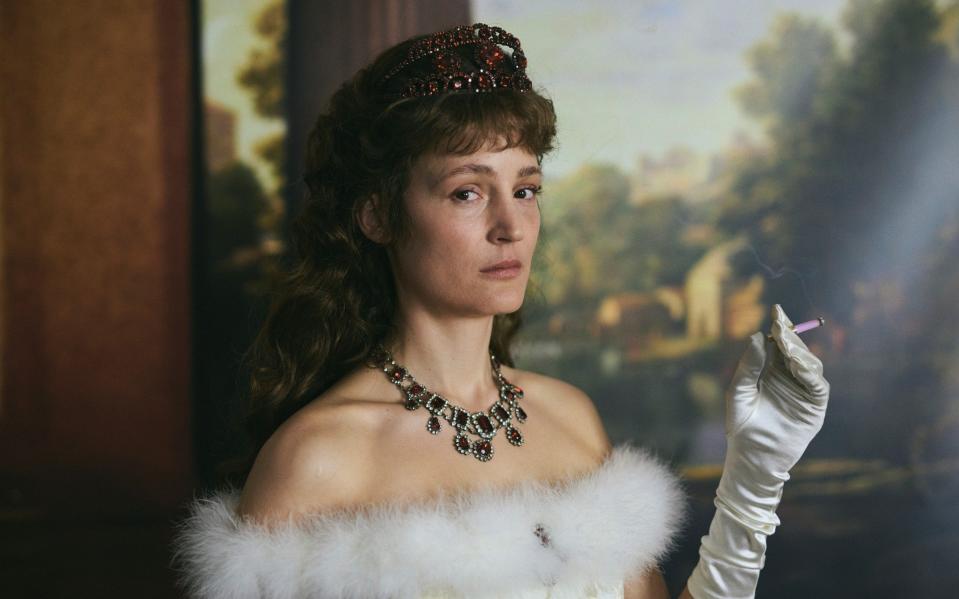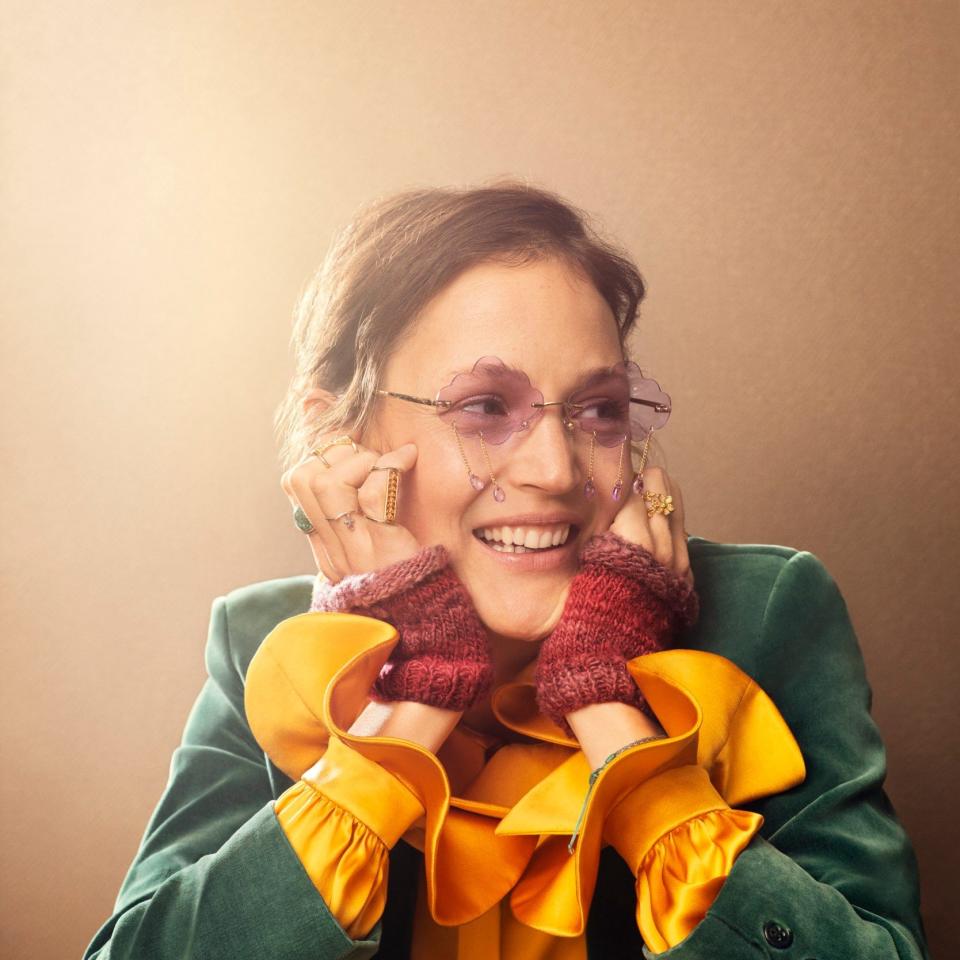Vicky Krieps: ‘Method acting? I saw it as a circus’

For most actresses, getting your mainstream breakthrough in a Hollywood movie opposite triple Oscar-winner Daniel Day-Lewis would be a dream come true. But for Luxembourgian Vicky Krieps, shooting and promoting Phantom Thread (2017) was a “traumatising train wreck”.
Directed by Paul Thomas Anderson (Boogie Nights, Magnolia, There Will Be Blood) and set in 1950s London, the film explored the intense power struggle between Reynolds (Day-Lewis), a predatory perfectionist of a high-society dressmaker, and Alma (Krieps), the latest in his long line of disposable, live-in model-muses.
“I never watch the films of people I’m going to work with, I don’t Google them,” Krieps explains via video from New York. “So I didn’t know so much about [Day-Lewis’s] method acting.” She didn’t realise he expected the cast and crew to address him in character, tiptoeing around the “great thespian”. She pantomimes the deference on set, clutching her cheeks and whispering: “He’s here! My God! It’s him!” An eye roll. “I am a person who thinks we are all equal. We all sit on the toilet. I could see it all like a circus. I just didn’t get afraid.”
At first, as an open-minded adventurer, she danced to Day-Lewis’s tune to see what she could learn. “But after half the movie, I was just really tired of it. Like: OK, I get it. It’s a game. I’ve played it. But can we just talk normally now, please?” Can she imagine a female star demanding such royal treatment? She snorts. “No. No-no-no-no-no!”
Critics were spellbound by the way Krieps’s character went toe-to-toe with Day-Lewis’s – never lowering her eyes or expectations. What they didn’t know is how little of that defiance was in the original script. Krieps says the resistance you see in her character’s eyes is “all me, just not having it” when Day-Lewis paces around her with his tape measure, pronouncing: “You have no breasts. My job is to give you some. If I choose to.”
Krieps tells me that “in the scene where Alma complains about ‘you and your people and your walls and your rules...’, that was really me talking to a famous actor, saying: ‘Do you really need everyone around you to behave so strangely and talk in a whisper?’ I decided I wasn’t going to look at him in a special way just because he’s Daniel Day-Lewis. He reacted to my feeling and played with that well. That dance became the movie, and in the end it was a wonderful thing.”

But after the film wrapped, Krieps felt patronised all over again by the way she was expected to market it. “The media training was insane,” she says. “There was this woman – very Old Hollywood – who said that I was not allowed to give my own opinions or describe my own experience. She said I should talk about the landscape and the costumes. I’m not joking. She made me watch videos of myself talking and told me I move my hands too much. I spent half a day after that walking around LA, thinking: ‘What the f---? Am I not supposed to be me?’”
In the meantime, she’d had an idea for the film that would become her masterpiece: Corsage, in UK cinemas now, about Elisabeth, Empress of Austria and Queen of Hungary, as she turned 40 in the 1870s. Krieps had an “intuition” that there must be a deeper story to be told about the pretty Bavarian aristocrat – known as Sissi – who features on so many Austrian chocolate boxes. “She was meant to be a good empress,” Krieps tells me. “Her husband [Franz Joseph I] told her his job was to control the empire, hers was merely to represent it.” Sissi was starved into 18in corsets and wheeled out voiceless at state occasions.
Krieps, patronised and objectified in Hollywood, identified with Sissi. “An intuition became a plan...” She persuaded Austrian director Marie Kreutzer to write a screenplay, reimagining Sissi (played by Krieps) as an anachronistic punk: we see her dancing to songs by Marianne Faithfull, hacking off her celebrated locks, screaming in history’s earliest home videos and shooting up heroin instead of attending state ceremonies.
Krieps had been raised to speak her mind, “always saying what I thought, surprised by the commotion that could cause”. Born in 1983 in Hesperange, southern Luxembourg, she spent her “hippy” childhood attending protests with her grandfather, a Holocaust survivor who spent his life campaigning for socialist causes and was instrumental in Luxembourg’s abolition of the death penalty.
“My mother raised me completely free,” she grins. “She taught me how to climb on trees and never taught me how to use make-up or wear a dress.” Her imagination and playful boundary-testing went down less well at school. “I was always looking out of the window,” she says. “When we read 1984, I suddenly got up and left the class. My teacher was so angry. I said: ‘I’m so sorry, I just had to check we are not in the novel.’”

Things boiled over at her high-school graduation. “When it was my turn to collect my diploma, I grabbed the microphone from the teacher and I went to the front of the stage and said: ‘I want to thank everyone for giving me this proof that I can learn by heart, copy and shut my mouth.’ This created a huge scandal in my country. It was on the news, on the radio, politicians spoke about it in parliament. I didn’t expect to make the news. It was just my honest feeling that I had to say something, you know?”
The spirit of rebellion followed Krieps into her career in European cinema, after she moved to Berlin. “There was one guy on the phone in Germany, shouting: ‘I will make sure that you will never work again!’ But it didn’t happen. So I learnt I can keep on doing things my way.” She had her children (now 11 and seven) in her 20s, without fretting about the impact on her career.
For Corsage, her “passion project”, the ever-studious Krieps did a mountain of research. She learnt to fence, she swam in icy water. And then something in her, once again, snapped. In tune with Sissi and still enraged by her experience on Phantom Thread, she refused to be a “good actress” on set. Instead, she jumped out of a window.
“You want to know what happened there?” she asks. “It was a fencing scene with a wonderful actor who I really admire. But there was something in him not able to accept losing in the scene. I was winning, as Sissi. That was how it was written. But he kept trying to be stronger and faster... He changed the choreography and that made me so sad... As a woman, we know so well how to lose. As actresses, we know how to lose. I don’t know how many times I’ve had to act dying, losing, suffering,” she sighs.
Mid-duel, Krieps tried to remember a single relationship she had had “where my partner was not trying to be stronger, not trying to somehow compete and win. Even to tear me down. These were not mean men. They are not men who walk around trying to destroy women. But there was something in them, like a little evil devil, that cannot accept losing against a woman. And I got so sad, so angry that I didn’t know where to go with myself... except out of the window. So that is what happened.” She laughs. “I remember thinking: I hope there is no scaffolding or anything out there. Luckily, there was just a light stand. After I jumped there was just... a silence.”
For Sissi, Krieps also decided to break the acting rules. “If I’m playing a villain, I am meant to show you my pain, so that you forgive my evil. If I’m playing somebody difficult, I have to show you that I’m suffering for it, so you can see ‘the poor woman was hit on her head when she was six years old’ [...] On this movie, for the first time, I was like: ‘F--- you. I’m not going to do that. I’m not going to take the audience by the hand.’ And I love the audience. I think they are intelligent. As an audience member, I am capable of remaining interested if an actor turns his back. So!”

As Sissi, she wore a corset so tight that her wardrobe assistants ended up with bleeding fingers after lacing it. “It was so terrible to wear, I don’t even want to talk about it,” Krieps says. “People tell you: the corset will help you find the character. I mean, it makes you stand up straight. But it presses on your solar plexus, so the feelings are all stuck.” She exhales, now she can. “A good example is the scene where my horse dies. Elisabeth was angry and sad. I had all these big feelings and it felt like dying because all that came out of me was this little-girl ‘euugh’. It was so, so, so weird.”
Sexually empowered, Sissi tells her husband when he is or isn’t welcome in her bed. She tells him when she does not want any more children. She tosses back her blankets to expose her naked body. “You want to know something funny about that scene?” asks Krieps. “I am wearing a pubic wig! We realised that if Sissi had so much hair on her head, she has more down there than I do. So every day I would enter my make-up trailer and there was a plastic box labelled ‘Empress Elisabeth pubic wig’ on the table.
“Inside was this little hairy triangle and I loved it! This was my best part of the whole movie. It was custom-made for me. Can you imagine that person thinking, ‘For Vicky, I’m going to add a little more red and brown.’ It’s the only thing I should have taken with me and framed. I’m so stupid. Maybe I can still get it. I’m going to ask...”
Krieps is such a direct, warm and witty conversationalist that I’m surprised when she tells me: “I have trouble speaking to men of my own age, I hate to say. I am really tired of a type of conversation I have, as soon as a man is older than 35. [...] I don’t blame them. I wouldn’t want to be them. I’m not saying that because I don’t like men or I’m against them, because I am not. [...] But I was just not made for that house, dog, man, car, life. You know? I never was. Recently, I realised: this is me, take it or leave it. If anyone wants to dance with me, I would love that. I love to dance. But I’m not going to dance for you.”
She shrugs. “I am single. I do not have time to relax because I am a mother... Because I speak four languages, people always ask me about my favourite. I say: silence. It is true. I wish I could do a whole movie without one word.” If anyone could, it is Krieps. She is no longer a woman “traumatised” by the film industry, she tells me. I ask if she could handle Hollywood if she went back now. She throws her head back and laughs. “Oh yes. I am sure I could. But,” she leans in, eyes glittering, “could Hollywood handle me?”
Corsage is in cinemas now

 Yahoo News
Yahoo News 
